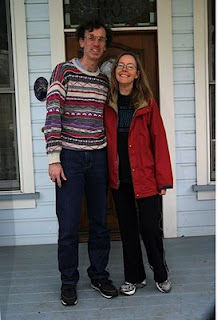
I've written elsewhere about the unfortunate lack of women in the computer field and the myth that the field is geeky. I've been wondering recently if that myth is actually accurate. Perhaps "geeky" isn't the right word, but it's certainly true that technical cleverness is more important than interpersonal skills in the computer field. It's also true that schools are not doing a good job preparing young women for this fact.
K-12 education has changed in the last 20 years. These changes play a role in the male dominance of the computer field. Schools emphasize group projects, emotional intelligence, presentations, and community-based learning. This approach is conditioning girls (and some boys) to enter fields where they can use those skills. It has also created a set of (mostly) boys who don't excel at those skills but who have honed the ability to work alone and to solve technical problems. Picture the typical geek who spends hours playing video games, writing software, and dashing off snide remarks to slashdot. These are the guys entering the computer field. Where are the girls? They have fled to the social sciences, business, and healthcare, and that's a shame for the computer field.
In my youth (do I sound like an old codger? :-), growing up in the 60s in the US, science and math were a big focus. We wanted to beat the Russians to the moon. Teachers encouraged girls and boys to learn science and math. They used lectures and reading assignments to help us learn. They assigned problem sets and lab projects that helped us think like scientists. This focus on science and math continued into the 70s which was also an important decade for women's liberation where the removal of artificial barriers for women resulted in many women joining the ranks of computer programmers and engineers.
Both girls and boys succeeded in the classrooms of the 60s and 70s if they were able to work hard, focus, listen, and read. Schools left some students behind, of course, and some students got shuffled (possibly unfairly) to auto mechanics and home economics. But the vast majority of college-prep students could read, write, calculate, analyze, solve problems, and focus on individual projects. They were perfect for the computer field.
We old-timers were conditioned to fit into the computer field. We learned binary in grade school. (Remember new math?) We were taught to think like engineers, to appreciate systems, technical details, calculations, consistency, precision, maintainability, and scalability.
Then the 80s and 90s happened. K-12 education changed. The focus moved from systems thinking, textbooks, lectures, and problem sets to emotional intelligence, teamwork, active learning, self esteem, multitasking, and verbal skills. Many girls thrived in this environment, but they didn't learn to think like engineers. Many boys got lost in the shuffle. (See Peg Tyre's and Susan Pinker's work on the underachievement of boys). Some of these boys simply ignored the touch-feely stuff and worked alone on the classroom computers, teaching themselves how to program, configure servers, and hack into the administration's computers. The male geek was born. A new set of students, almost all male, were now conditioned to fit into the computer field.
Now we find ourselves in a situation where fewer and fewer women are entering the computer field and male geeks are taking over. Can this be fixed? I believe it must be fixed and that this must happen soon before we reach a turning point where almost no women are left in the computer field.
Those of us already in the computer field can help by providing more opportunities for women (and men) to work on team projects, to collaborate, to multitask, and to use the communications skills that girls demonstrate so effectively in modern classrooms. But K-12 education must change also. The pendulum has swung too far. The touchy-feely, emotional-intelligence, teamwork approach needs to be tempered with hard-core math and science. Bring back the problem sets. Bring back the individual projects. Bring back the lab work that is as much about the scientific method as it is about chatting with your lab partner. Put those kids back to work! We need rigorous thinkers and we need the girls. Computer technology is too important to let it be dominated by one gender.




























